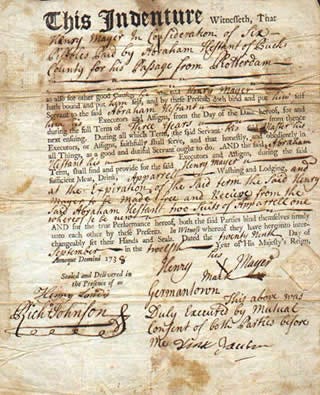Wretchedness of White Servants (1770)
Persons in a state of servitude are under four distinct denominations: negroes who are the entire property of their respective owners; convicts who are transported from the mother country for a limited term; indented servants who are engaged for five years previous to their leaving England; and free-willers who are supposed from their situation to possess superior advantages.
Persons convicted of felony and in consequence transported to this continent, if they are able to pay the expense of passage are free to pursue their fortune agreeably to their inclinations or abilities. Few however, have means to avail themselves of this advantage. These unhappy beings are generally consigned to an agent who classes them suitably to their real or supposed qualifications, advertises them for sale, and disposes of them for seven years to planters, to mechanics, and to such as choose to retain them for domestic service. Those who survive the term of servitude seldom establish their residence in this country. The stamp of infamy is too strong upon them to be easily erased. They either return to Europe and renew their former practices or if they have fortunately imbibed habits of honesty and industry, they remove to a distant situation where they may hope to remain unknown and be enabled to pursue with credit every possible method of becoming useful members of society.
The generality of the inhabitants in this province are very little acquainted with those fallacious pretenses by which numbers are continually induced to embark for this continent. On the contrary, they too generally conceive an opinion that the difference is merely nominal between the indented servant and the convicted felon. Nor will they readily believe that people who had the least experience in life and whose characters were unexceptionable would abandon their friends and families and their ancient connections for a servile situation in a remote appendage to the British Empire. From this persuasion they rather consider the convict as the more profitable servant, his term being for seven, the latter only for five years. And I am sorry to observe that there are but few instances wherein they experience different treatment.
Negroes being a property for life, the death of slaves in the prime of youth or strength is a material loss to the proprietor. They are therefore, almost in every instance under more comfortable circumstances than the miserable European over whom the rigid planter exercises an inflexible severity. They are strained to the utmost to perform their allotted labor and, from a prepossession in many cases too justly founded, they are supposed to be receiving only the just reward which is due to repeated offenses.
The situation of the free-wilier is in almost every instance more to be lamented than either that of the convict or the indented servant. The deception which is practiced on those of this description being attended with circumstances of greater duplicity and cruelty. Persons under this denomination are received under express conditions that on their arrival in America, they are to be allowed a stipulated number of days to dispose of themselves to the greatest advantage. They are told that their services will be eagerly solicited in proportion to their abilities; that their reward will be adequate to the hazard they encounter by courting fortune in a distant region. And that the parties with whom they engage will readily advance the sum agreed on for their passage, which being averaged at about nine pounds sterling, they will speedily be enabled to repay and to enjoy in a state of liberty, a comparative situation of ease and affluence. It is therefore, an article of agreement with these deluded victims that if they are not successful in obtaining situations on their own terms within a certain number of days after their arrival in the country, they are then to be sold in order to defray the charges of passage at the discretion of the master of the vessel or the agent to whom he is consigned in the province.
You are also to observe that servants imported even under this favorable description are rarely permitted to set their feet on shore until they have absolutely formed their respective engagements. As soon as the ship is stationed in her berth, planters, mechanics, and others repair on board. The adventurers of both sexes are exposed to view and very few are happy enough to make their own stipulations, some very extraordinary qualifications being absolutely requisite to obtain this distinction. And even when this is obtained, the advantages are by no means equivalent to their sanguine expectations. The residue, stung with disappointment and vexation, meet with horror the moment which dooms them under an appearance of equity to a limited term of slavery. Character is of little importance. Their abilities not being found of a superior nature, they are sold as soon as their term of election is expired; apparel and provision being their only compensation till on the expiration of five tedious laborious years they are restored to a dearly purchased freedom.
Source: William Eddis, Letters from America (London, 1792), 63-75. https://archive.org/details/in.ernet.dli.2015.45494/page/n331/mode/2up




